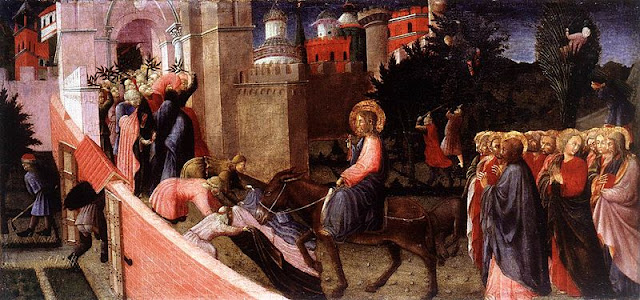But what does “Hosanna” mean? Obviously, it’s a word of celebration; that much is clear from the Gospel. In Jesus’s day, the word was used in the way we might say, “Praise God! Glory be!” But “Hosanna” has an older meaning, as well, that we should know. “Hosanna” originally was an abbreviated prayer, a blending of two words that meant “save” or “rescue” and “now”. In the psalms, for example, “Hosanna” meant “Save us, Lord – now!”
 |
| Entry of Christ into Jerusalem (c. 1440) by Pietro di Giovanni d'Ambrogio |
Keeping in mind these two meanings – a cry of celebration, and a cry for salvation – we can better understand the meaning of our liturgy today. The crowds in the Gospel greeted Jesus as the Messiah, the rightful Jewish king, and we hail him as the Savior, the Son of God. They welcomed him with joy, expecting him to bring earthly deliverance: to defeat Israel’s foes and establish a new reign of peace. We praise him with reverence, recognizing that he came not to conquer in earthly terms, but to deliver us from ancient enemy of sin and establish an eternal reign of peace. In faith, we can understand and, yes, celebrate what the crowds could not have foreseen: that this king has come not to conquer but to die, in order to give life to us.
Friends, let us not treat this week like any other: let us make it truly “holy”, adopting a spirit of prayer and meditation so that we can better understand all that Jesus has done for us. Reread the Passion account, pray through the Stations of the Cross, contemplate a crucifix for a while; and as you do so, let yourself be guided by that word that we say today, and at every Mass. “Hosanna!” – that is, “Praise you, Jesus!” “Save us, Lord – now!”
No comments:
Post a Comment